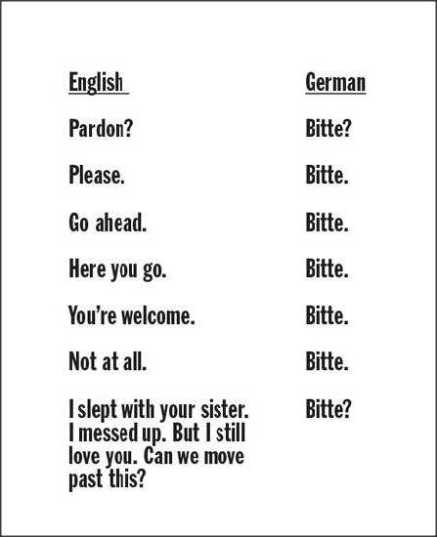I consider my command of German to be pretty good. I’ve learnt it in high school, I’ve spent many summers of my teenage years in Germany, learning the language on the spot (as it was oh so popular back in the 1980s), I have been a fan of Nena and Falco, I’ve read Goethe and Böll, I’ve watched Fassbinder’s films and Elfriede Jelinek’s plays and I have even written my PhD thesis in German, which should all count for something. I have been living in Vienna for some time now, I speak German every day, I listen to Austrian radio stations and so on, and so forth; however, now and then I can still get quite amazed by the new and imaginative ways this language finds to torture us, the unsuspecting foreigners.
The puzzlement doesn’t come accross very often nowadays; however, when I first moved to Vienna, there have been quite a few perplexing situations. Let’s start from the beginning.
1. Mahlzeit
When you live in a non-German speaking country and learn German in school, what you get is a standard version spoken in Germany, the so-called Hochdeutsch. And it teaches you that before a meal, you should say guten Appetit, which translates into something like enjoy your meal. However, as I ate some of my first meals in Vienna in the common room of my student dormitory, all of the colleagues who happen to walk by said Mahlzeit, which literally means meal. I was beyond confused. Ok, I thought to myself, yes, it is a meal. So what? The confusion grew even bigger after I saw people pass each other in the university hallway sometime around noon, saying Mahlzeit and replying with the same word. I thought I have entered a freaking twilight zone.
Finally, I asked one of my colleagues to explain why do they point at each other’s food, emphasizing that it is a meal. And, furthermore, why do they keep saying this peculiar word to each other for no obviour reason whatsoever. After my colleague recovered from the laughing attach, he explained that in Austria, it means guten Appetit. If you use the Hochdeutsch version, you are considered to be stuck-up and aloof. It is also used as a greeting around the lunchtime. So go figure.
2. Guten Rutsch
In English and most other languages I’m familiar with, people usually say Happy New Year, which indicates that the sender of the message wishes good luck for the recepient’s whole year. Not in Vienna. Here, you are told that you should have einen guten Rutsch ins neue Jahr, meaning a good slide into the new year. So, the wish covers merely the first few minutes of the year. Once you’ve slided into the new year, you’re on your own. The wish doesn’t extend any further.
3. Schöne Weihnachten
When wishing someone a Merry Christmas, one usually says fröhliche or frohe Weihnachten. However, in 2012 I started getting wishes for my Christmas to be schön (beautiful, lovely), rather than merry or jolly. The trend has developed so quickly, that almost all of 2013’s Christmas wishes said the word beautiful. Let’s wait and see what happens next with the good old Christmas in the years to come.
4. Food and beverages
Now, we’re entering a sensitive ground, because if you don’t know your food, you’re about to end up hungry or at least with a strange thing placed on your plate. Forget most of what you’ve learnt in school or at least leave it for your trip to Germany. In Vienna, you don’t eat Brötchen, but Semmel (bread rolls) and you don’t eat it with Quark, but Topfen (cottage cheese). There are no Tomaten in your salad, there are Paradaiser (tomatoes) and with meat, you don’t get Kartoffeln, but Erdäpfel (potatoes). Finally, if you want to flush it all down with beer, you should order either Pfiff (0,2 dcl), Seidl or Seitl (0,3 dcl) or Krügerl (0,5 dcl).
5. I, A!
Oh yes, those letters indeed have the meaning of words. I is shortened for ich (meaning I), and A stands for ein (an indefinite article). Which makes the following sentence completely legitimate: I mag a bissrl ____ (insert a wish of your choice).
* * *
Of course, the list is almost endless; don’t get me wrong, I love the German language and I love its Austrian version. However, if you come to live here unprepared or ill prepared, you’re about to encounter some surprises. That’s all.

